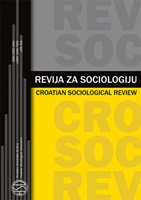Percepcija i iskustvo rodne diskriminacije studenata i studentica na Sveučilištu u Zagrebu
Perception and Experience of Gender Discrimination Among Students at the University of Zagreb
Author(s): Iva Ćavar, Ana OpačićSubject(s): Gender Studies, Higher Education , State/Government and Education, Social Theory, Sociology of Education
Published by: Hrvatsko sociološko društvo
Keywords: gender equality; gender discrimination; higher education; gender stereotypes;
Summary/Abstract: The aim of this quantitative research was to analyse the experience of gender discrimination at the University of Zagreb from the students’ perspective and assess the contribution of socio-demographic characteristics and study characteristics in explaining the experience, witnessing and perception of gender discrimination. The role congruity theory and the theory of group awareness were used as a framework. The research was conducted in 2020 with the participation of 274 students from the University of Zagreb. The results were analysed by regression analysis (simple and hierarchical regression analysis with additional verification of the moderating effect of witnessing gender discrimination on the relationship between the experience and perception of gender discrimination). The results showed that the experience of gender discrimination exists in fields where the number of male and female students is nominally equal. However, certain areas, such as bio-medical studies and integrated studies, stood out as pockets of discrimination, where students were more likely to personally experience gender discrimination and witness discrimination against others. In the perception and witnessing of gender discrimination, a key factor is personal experience that helps build group awareness. Gender discrimination is perceived as a group, social and political issue rather than a matter of personal factors or success. Descriptive gender stereotypes targeting both sexes, but also prescriptive stereotypes directed against women in positions of power, are more often observed. Therefore, we can conclude that, from the students’ perspective, the academic environment still exhibits characteristic of a glass ceiling, regardless of the predominant presence of female students at the university.
Journal: Revija za sociologiju
- Issue Year: 53/2023
- Issue No: 2
- Page Range: 179-212
- Page Count: 34
- Language: Croatian

